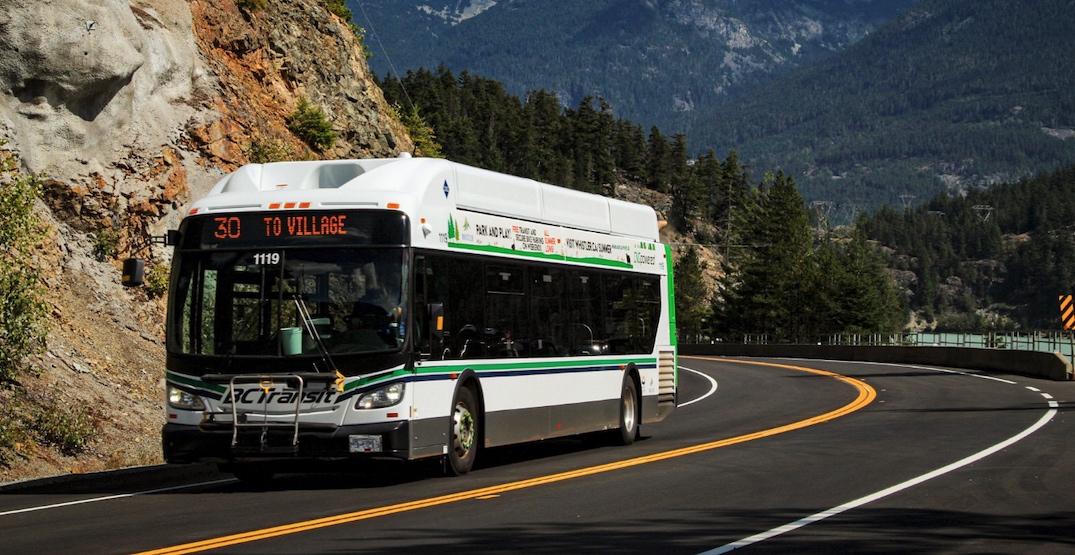Written for Daily Hive Urbanized by North Vancouver resident Johnathan French.
Most cities in British Columbia have access to public transit, but intercity travel is still expensive, inconvenient, or impossible without a car (at least outside of Metro Vancouver). We need more options, not just for the environment but also for accessibility, convenience, and cost savings. BC Transit can make this happen, but they need support from the province.
Earlier this year, Alberta announced its Passenger Rail Master Plan. This involves a new high-speed passenger rail line between Calgary and Edmonton, plus regional rail connections to Grande Prairie, Fort McMurray, Banff, Medicine Hat, and Lethbridge.
In Ontario, Metrolinx is slowly building out its regional rail and bus services with GO Transit, with plans to electrify the network and provide frequent, all-day service to most of the Greater Toronto Area.
Here in BC, Metro Vancouver is well-served by TransLink, and there are plans to expand service in the coming decades. BC Transit is meant to cover the rest of the province. They provide some decent local bus services (like in Victoria), but most cities outside of Metro Vancouver have poor coverage, and intercity connections are generally inadequate or non-existent.
BC Transit gets much of its funding from municipalities, and provides local bus services within these municipal areas. There’s some provincial funding for intercity connections, but it’s woefully inadequate. Including municipal and provincial contributions, BC Transit received just $376.2 million in 2021/2022. This is not enough funding to provide public transit to 2.5 million people.
We spend vast amounts of taxpayer money on our highways, yet they’re hardly used by our provincial public transit agency. BC Transit has a handful of highway bus routes, like the No. 66 Fraser Valley Express from Chilliwack to Burnaby, but there are major gaps. We need frequent buses from Vancouver to Squamish and up to Whistler and Pemberton. We need connections between Kamloops, Kelowna, Revelstoke, Merritt, Prince George, Prince Rupert, and more.

No. 66 Fraser Valley Express. (BC Transit)

Diagram of No. 66 Fraser Valley Express bus stops and connections to other bus services starting in March 2022, when it is extended to SkyTrain Lougheed Town Centre Station. (Fraser Valley Regional District)
There are private bus operators for a few of these routes, but they’re expensive and infrequent. For example, the Island Link Bus goes from Victoria to Courtenay, but it costs $62, or $80 without a reservation, and there are only three buses per day.
Rural areas are even more dire; Mountain Man Mike’s buses can get you from Vancouver to Osoyoos, but it’ll cost $132 and only runs twice a week on Thursdays and Saturdays.
These are good companies, but they shouldn’t be solely responsible for connecting our smaller cities. We don’t need to connect every tiny village, but we should at least run buses along our major highways. With adequate funding, BC Transit could provide comprehensive coverage throughout most of the province. Half of BC lives outside of Metro Vancouver, and they deserve good service.
Despite serving the same number of people as TransLink, BC Transit gets much less funding. This isn’t to say we should take away TransLink’s funding; rather, we should elevate BC Transit into a provincial transportation authority with the power and funding to fulfil its mandate.
In 2015, BC Transit put together a Sea to Sky Transit Future Plan with the intent to link Vancouver with Squamish, Whistler, and Pemberton. It’s now 2024, and they’re still studying the corridor.
It would only take $3.3 million to fund the Sea to Sky corridor. Imagine what BC Transit could accomplish with a billion dollars.

BC Transit bus on the Sea to Sky Highway near Whistler Village. (Trevor Bodnar/Resort Municipality of Whistler)

Proposed interregional bus services along the Sea to Sky Highway between downtown Vancouver and Pemberton. (BC Transit)
They could invest in BC Bus North, greatly expanding its reach and scope. They could buy out private operators like the Link Island Bus company, lowering fares and improving service. They could even revitalize the Vancouver Island Railway, bringing passenger rail back to Victoria, Courtenay, and Port Alberni.
Of course, more funding would greatly improve local transit services as well.
Funding isn’t free and usually requires higher taxes. However, funding BC Transit could significantly lower transportation costs for most people. The average Canadian spends $1,387 per month on their personal vehicle; imagine having that money available for rent, mortgage payments, and food instead.
For those who cannot drive, such as young students or people with mobility challenges, access to public transit would be life-changing.
For those who need to drive, funding for BC Transit would mean less traffic. Buses are cheaper than widening highways and far more efficient.
For some, having the option to read, work, or just enjoy the scenery while on the go is reason enough to take public transit.
BC Transit provides a good service, but it could do so much more. Let’s give them the funding they need to properly serve British Columbians.